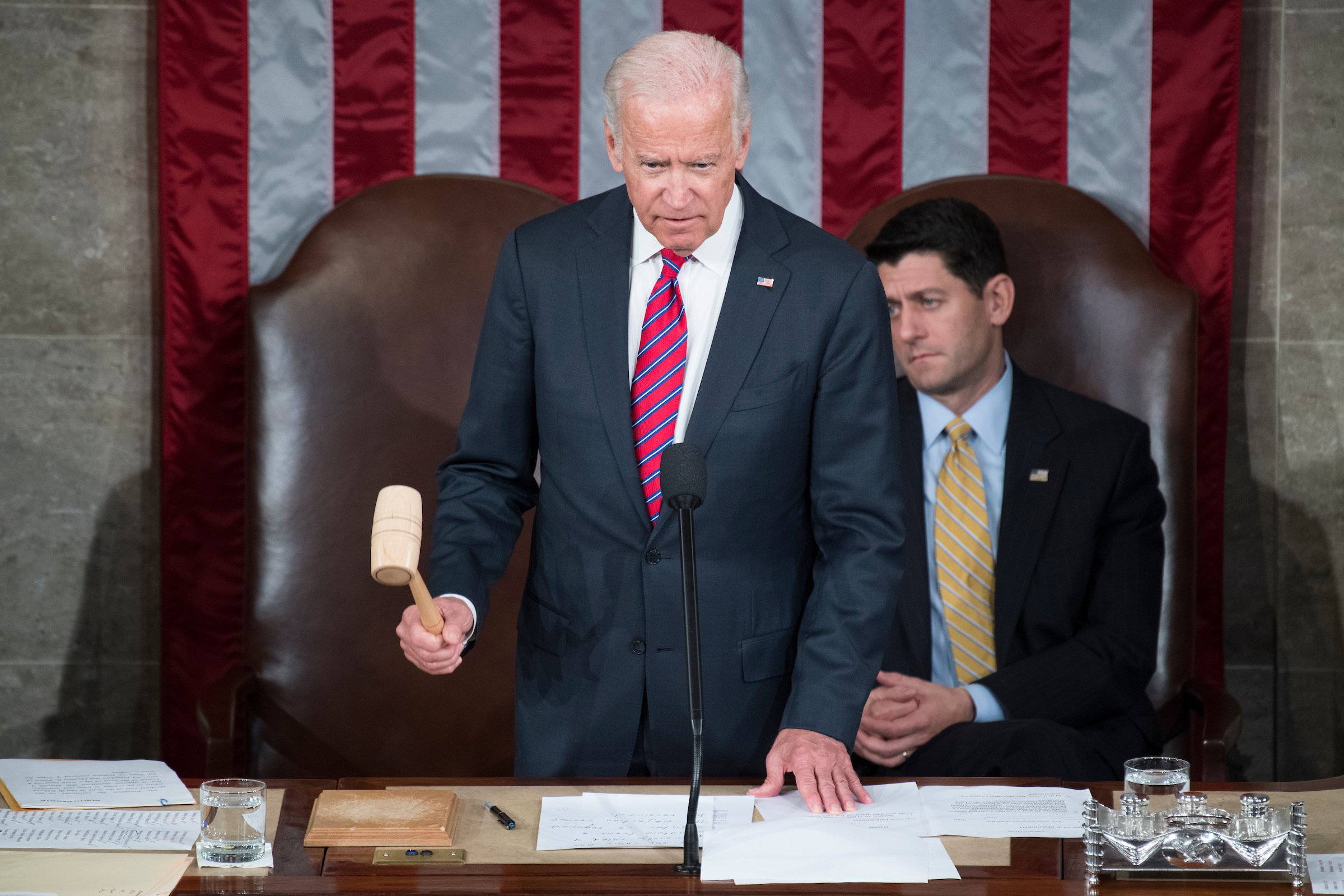Opinion: Joe Biden — The Most Decent Man in Politics
Former vice president served with honor while dealing with a lifetime of suffering

NEW YORK — Joe Biden’s Monday night book launch at Lincoln Center was oddly apolitical for an ostensibly political event. The name Donald Trump was not even mentioned until 40 minutes into Biden’s onstage conversation with Stephen Colbert.
Rather than cataloging Trump’s transgressions — a task that would be daunting for the loquacious former vice president — Biden took the softer approach of uttering soothing lines like, “I really do think that this is about to end.” In contrast to Trump, “the American people are basically decent and honorable,” he said.
Decent is a quintessentially Biden word. At first glance, it suggests the barest level of acceptability, like a decent meal or a decent job. But applied to people it also conveys a moral component — an inherent quality of goodness that is often noticed only when it’s missing.
During the more than four decades, dating back to the Nixon administration, that Biden has been in public life, there have been more charismatic political leaders and wiser policymakers. But it is hard to think of anyone who, in basic human terms, has been more decent than Joe Biden.
That was why the 2,700-seat David Geffen Hall (normally the home of the New York Philharmonic) was filled Monday at prices ranging from $76 to $446.50. Everyone received copies of Biden’s new book, “Promise Me, Dad: A Year of Hope, Hardship and Purpose.” The pricey tickets also included a meet-and-greet with Biden and a photograph to commemorate the occasion.
Penny foolish
Normally, vice presidential memoirs have the literary allure of yellowing paper copies of the Congressional Record. Dan Quayle’s 1994 classic, “Standing Firm,” now available at Amazon for as little as a penny, boasts such stirring sentences as “Actually, among the faithful I was always a successful fundraiser.”
Rather than a standard retrospective of the Obama years, “Promise Me, Dad” is a wrenching account of 2015, the year that Biden’s son, Beau, died of brain cancer and the vice president reluctantly decided not to challenge Hillary Clinton for the Democratic nomination.
Biden’s promise to his dying son was not about the presidency. As Biden explained Monday night, “It’s not what people think — that Beau said to me, ‘Promise me, you’ll run.’” Rather Biden said, “Beau worried that I would withdraw inward.”
Everyone in public life who draws a human breath has his or her own personal sorrows and tragedies. But the Kennedys aside, Biden’s ordeals stand alone.
A month after Biden won an upset Senate victory in 1972, his wife Neilia and their daughter Naomi were killed in a car crash. As Richard Ben Cramer describes it in his haunting 1992 portrait of Biden in “What It Takes,” the fledgling Delaware senator was initially too distraught to come to Washington and almost abandoned politics to raise his two surviving sons, Beau and Hunter.
In early 1988, shortly after Biden abandoned his first bid for the White House after a plagiarism scandal, he almost died from a brain aneurysm. Had Biden still been on the campaign trail, he almost certainly would have soldiered on with excruciating headaches until it was too late. Stealing the words of British politician Neil Kinnock, in essence, saved Biden’s life.
At the end of “What It Takes,” Cramer writes with eerie prescience, “If there came a time when [Biden] should run for the White House, he’d know. … There would be a time, in his life, to establish that he was of good character. If he lived long enough, that, too, would come.”
In theory, 2008 should have been Biden’s year. Against the backdrop of Bill Clinton’s sexual transgressions and George W. Bush’s march of folly in Iraq, Biden’s long-ago plagiarism seemed petty in retrospect. But despite strong debate performances and respectable Iowa crowds, the underfunded garrulous Delaware senator was no match for Barack Obama or Hillary Clinton.
Changing course
As “Promise Me, Dad” makes clear, Biden didn’t abandon his 2016 dreams until five months after Beau died. At a final October 2015 meeting, Biden’s longtime strategist Mike Donilon abruptly changed direction and said to the vice president, “I don’t think you should do this.”
Donilon’s turnabout had nothing to do with polls or Hillary Clinton’s daunting fundraising and endorsement edge. Rather, as Biden writes, “Mike later told me that looking at me that night, as it got to be zero hour, he could see my jaw clenching tighter. The pain he read on my face was off the charts.”
Unlike most political memoirs, there is little score-settling in “Promise Me, Dad.” True, Biden revels in once telling Vladimir Putin, “I’m looking into your eyes. I don’t think you have a soul.” And he says of Hillary Clinton that after they had a private political meeting in early 2015, “she did not evince much joy at the prospect of running. … She seemed to me like a person propelled by forces not entirely of her own making.”
It is impossible to game out in retrospect how Biden might have survived in a three-way nomination fight with Hillary and Bernie Sanders. But had he somehow snagged the nomination against Trump, “Republicans for Biden” would probably have been the largest political crossover movement in modern history.
Late in the conversation Monday night, Colbert uttered the magic phrase, “President Biden,” and the concert hall erupted in applause. It was hard to tell whether the enthusiasm was a wistful look backward or a hopeful nod to the 2020 election, when Biden will be nearly 78. But having endured and surmounted a lifetime of suffering with honor, bravery and human warmth, Biden reminds us that sometimes there are fourth or even fifth acts in politics.
Roll Call columnist Walter Shapiro is a veteran of Politics Daily, USA Today, Time, Newsweek and The Washington Post. Follow him on Twitter @MrWalterShapiro.





